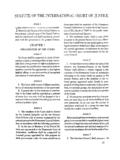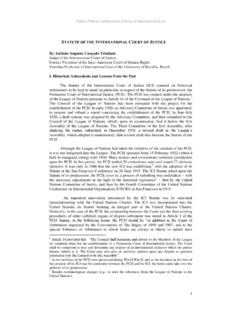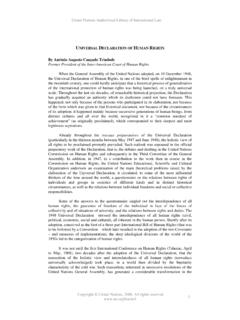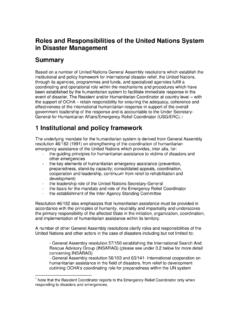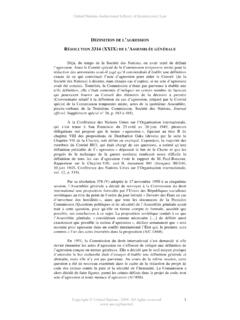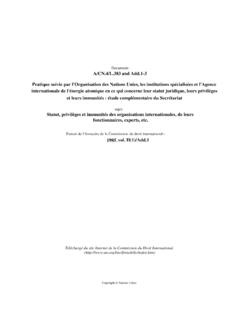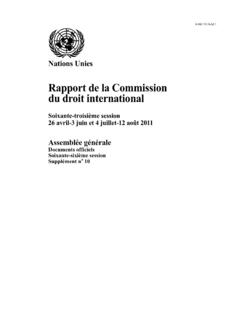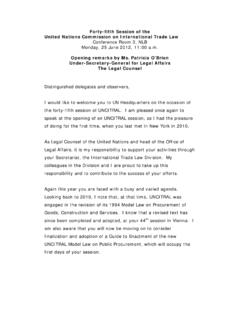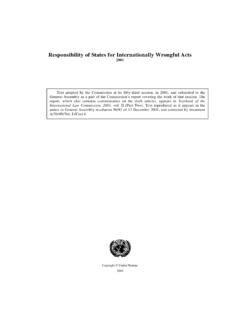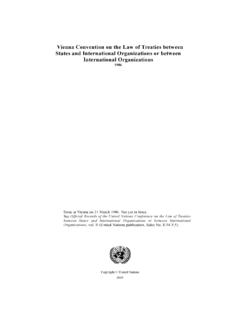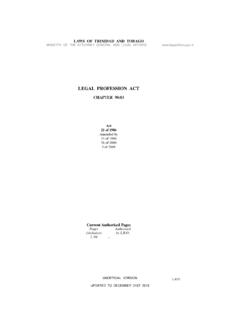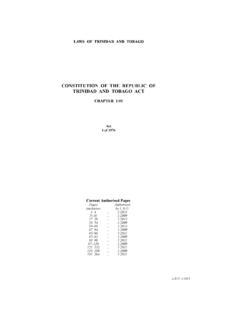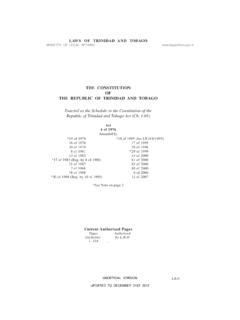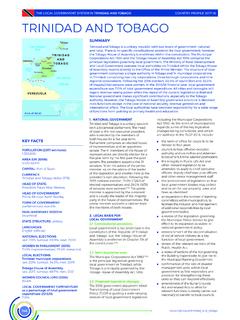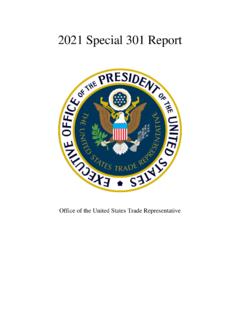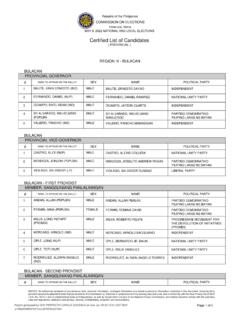Transcription of HUMAN RIGHTS LAW IN THE COMMONWEALTH CARIBBEAN 1.
1 1 HUMAN RIGHTS LAW IN THE COMMONWEALTH CARIBBEAN Outline of Lecture 1. Context: (a) Identification of COMMONWEALTH CARIBBEAN countries (b) Socio-economic environment (c) Identification of the main sources of HUMAN RIGHTS law 2. Agenda (a) Significance of HUMAN RIGHTS Law in CARIBBEAN societies (b) Overview of the International Law commitments of various CARIBBEAN States (c) Relationship between International Law and Municipal Law in the CARIBBEAN (d) Institutions that help to determine HUMAN RIGHTS protections in the CARIBBEAN (e) Domestic HUMAN RIGHTS law (sources and content) (f) Application of some particular HUMAN RIGHTS in the CARIBBEAN context 3.
2 Guiding questions: To what extent are international HUMAN RIGHTS norms recognized in the COMMONWEALTH CARIBBEAN ? CARIBBEAN Governments maintain that they are in the mainstream of HUMAN RIGHTS protection in the world: is this a fair reflection of reality? 4. Specific Treaties: In support of the proposition that CARIBBEAN States are in the mainstream of HUMAN RIGHTS protection, these States sometimes emphasize that they are parties, in significant number, to the following multilateral HUMAN RIGHTS treaties: (a) The International Covenant on Civil and Political RIGHTS (the ICCPR) (8 States out of 12 possibilities), (b) The International Covenant on Economic, Social and Cultural RIGHTS (the ICESCR) (7 States out of 12 possibilities), (c) The Convention on the Elimination of All Forms of Discrimination against Women (the CEDAW) (11 States), (d) The Convention on the Elimination of All Forms of Racial Discrimination (the CERD) (10 States), (e) The International Convention on the RIGHTS of the Child (11 States) 2 5.
3 With respect to some treaties, however, the rate of ratification is relatively low. This applies, for instance, to: (a) The American Convention on HUMAN RIGHTS (4 States), (b) The First Optional Protocol to the ICCPR (2 States), (c) The Second Optional Protocol to the ICCPR (0 States), (d) The Optional Protocol to the ICESCR (0 States), (e) The Optional Protocol to the CEDAW (3 States). 6. The Dualist Tradition COMMONWEALTH CARIBBEAN systems, based on the English common law, adopt a dualist approach to the relationship between International Law and municipal law. Thus, with respect to treaties, the State normally needs to pass domestic legislation to give effect on the municipal plane to rules of law accepted in treaties.
4 This applies to the HUMAN RIGHTS treaties to which the CARIBBEAN States are party. This dualist approach is confirmed in a variety of cases including, for instance, Chung Chi Cheung v. R (1939) AC 160 and Rayner (Mincing Lane) Ltd v. The Department of Trade and Industry (1990) 2 AC 418, at p. 476. The full rigour of this approach has been softened in recent years by the concept of legitimate expectations: thus, in the decision of the CARIBBEAN Court of Justice in The Attorney General of Barbados et al v. Jeffrey Joseph and Lennox Boyce (CCJ Appeal No.)
5 CV2 of 2005), it was held that in some circumstances ratification of a treaty could give rise to the legitimate expectation that the treaty will apply in some respects on the domestic plane, even if legislation has not brought the treaty into force locally. 7. With respect to customary international law, there is some authority that rules of custom are automatically a part of the English common law: see, , R v. Keyn (1876) 2 Ex. D. 63, Trendtex v. The Central Bank of Nigeria (1977) 529. But there is no clear support for this conclusion in decisions of the courts in the CARIBBEAN .
6 8. Consequently, in assessing whether COMMONWEALTH CARIBBEAN States are in the HUMAN RIGHTS mainstream, we need to consider not only the level of ratification of treaties, but also whether the rules in particular treaties have been incorporated into domestic law. In some instances, treaties are ratified, but the treaty rules are not incorporated into domestic law. 3 9. Institutions The main institutions that assist in ensuring that CARIBBEAN States respect international HUMAN RIGHTS norms include: (a) The local courts. Usually, there is a hierarchy of courts with the Judicial Committee of the Privy Council being the highest court in a three-tiered appellate system: appeals often go from the High or Supreme Court, to the Court of Appeal, and then to the Judicial Committee of the Privy Council.
7 For two COMMONWEALTH CARIBBEAN countries, the Judicial Committee of the Privy Council has been replaced as the highest court by the CARIBBEAN Court of Justice. (b) The United Nations HUMAN RIGHTS Committee (for countries party to the ICCPR and the First Optional Protocol to the ICCPR). (c) The Inter-American Commission on HUMAN RIGHTS (for countries party to the American Convention on HUMAN RIGHTS ). (d) The Inter-American Court for HUMAN RIGHTS (only Barbados is party to the jurisdiction of this court). (e) Non-Governmental Organizations. In some countries, there are active non-governmental organizations in the area of HUMAN RIGHTS .
8 There is no significant interference by governments in the activities of these organizations. 10. Sources of Law on the Municipal Plane (a) The Constitution. Generally, COMMONWEALTH CARIBBEAN States have constitutional provisions that set out the fundamental RIGHTS and freedoms of persons in each jurisdiction. These constitutional provisions show a marked similarity from one country to another, with most of them owing their origins to parts of the Universal Declaration on HUMAN RIGHTS and the terms of the European Convention on HUMAN RIGHTS .
9 (b) Legislation. In some cases, the rules of a particular treaty will be expressly incorporated into local law. So, for example, provisions in the Convention on the RIGHTS of the Child have become part of statutory law pertaining to children in various CARIBBEAN countries. (c) The Common Law. Various decisions of municipal courts also take into account rules of the common law that protect HUMAN RIGHTS : see, for example, the writ of habeas corpus. 4 11. The RIGHTS in Practice (A Broad Overview) The typical COMMONWEALTH CARIBBEAN constitution (sometimes referred to as the Westminster Export-Model Constitution) will set out a fairly broad range of civil and political RIGHTS in a separate chapter.
10 These civil and political RIGHTS will invariably include, among others, (a) The Right to Life, (b) Freedom from Inhuman or Degrading Punishment or Treatment, (c) Freedom of Thought, Conscience and Religion, (d) Freedom of Expression, (e) The Right to a Fair Trial, (f) Freedom of Movement, (g) Freedom from Discrimination on certain grounds, (h) The Right to Property, (i) Freedom from Arbitrary Arrest or Detention, and (j) The Due Process of Law (including the Right to a Fair Trial). 12. Restrictions to be Noted Although the typical COMMONWEALTH CARIBBEAN country thus offers persons within its jurisdiction a significant base of HUMAN RIGHTS protection, in some instances these RIGHTS are restricted.
